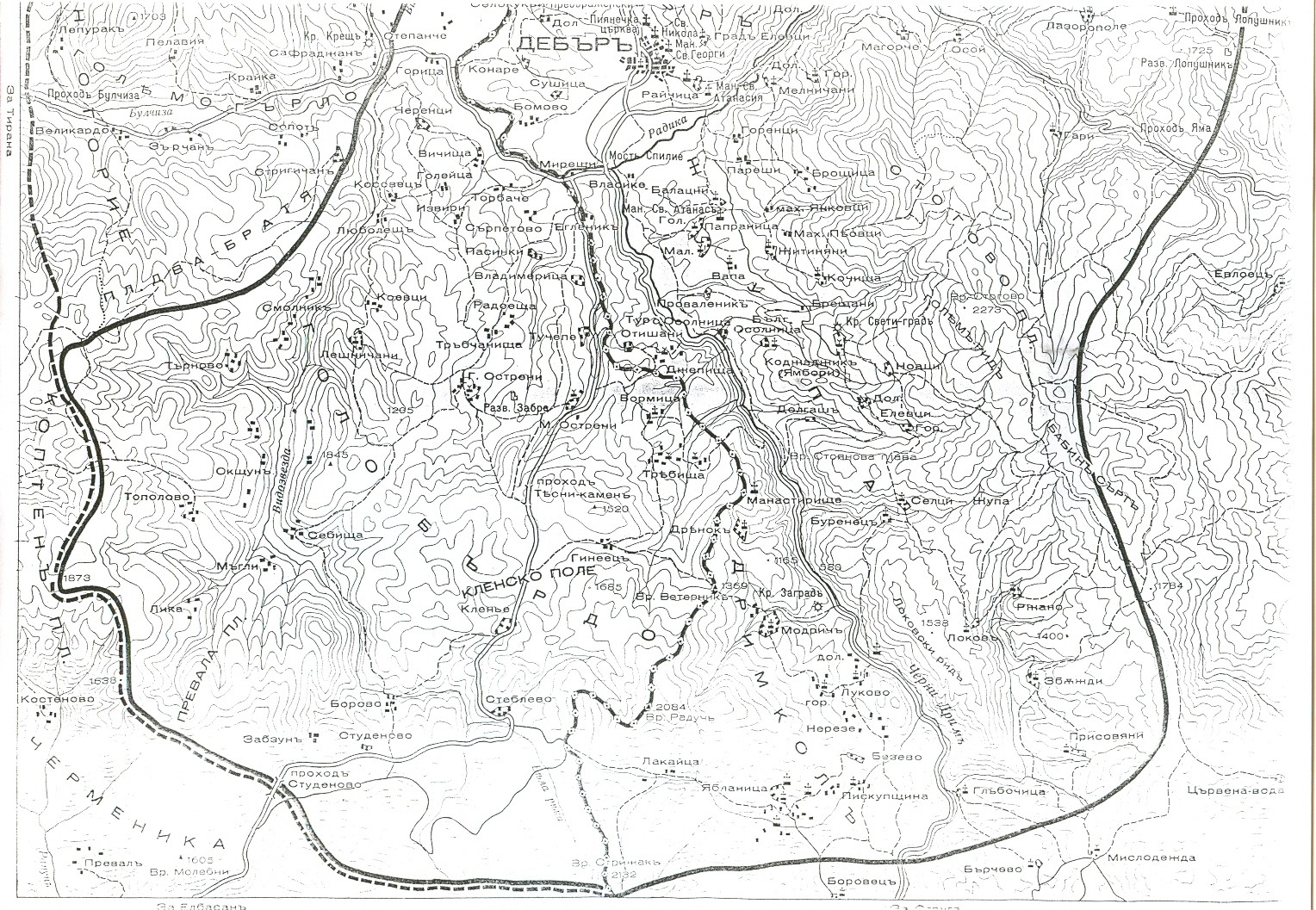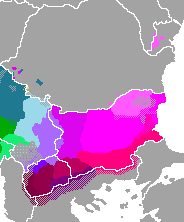|
Stëblevë
Stëblevë ( bg, Стеблево, mk, Стеблево) is a village and a former municipality in the Elbasan County in eastern Albania. At the 2015 local government reform it became a subdivision of the municipality Librazhd. The population at the 2011 census was 809.2011 census results The municipal unit consists of the villages Borovë, Llangë, , Prodan, Sebisht, Steblevë and Zabzun. History Steblevë appears in the Ottoman '''' of 1467 as a village in the ...[...More Info...] [...Related Items...] OR: [Wikipedia] [Google] [Baidu] |
Moglicë, Elbasan
Moglicë is a historic village in the Stëblevë commune, Elbasan County, in Albania. At the 2015 local government reform it became part of the municipality Librazhd. Until 1991 Moglicë was under the administration of Dibër, Albania. Since 1991 Stëblevë consists of the villages Borove, Llange, Moglicë, Prodan, Sebisht, Steblevë and Zabzun. History Moglicë is the birthplace of Hasan Moglica (1854–1915), a scholar, educator, leader, engineer, philosopher, patriot, nationalist figure and the martyr of Albanian language and nation. He was buried alive by the Serbian army on 15 June 1915 when he refused to sell Albanian land. Albanian Teacher Hasan Moglica had transformed his 28-room stone-house into a huge library and language school. As of today, memories of glory days of Moglicë of Dibra remain an important part of the Albanian culture. The Moglica's Publisher (In Albanian: Moglicë) is a Dibër publishing house that was founded by The Moglica's House in 1876 to publ ... [...More Info...] [...Related Items...] OR: [Wikipedia] [Google] [Baidu] |
Gollobordë
Gollobordë ( sq-definite, Golloborda, bg, Голо Бърдо/Golo Bărdo, mk, Голо Брдо/Golo Brdo) refers to a geographical area of traditionally 24 villages of which 18 are situated primarily in eastern Albania, with a small portion consisting of six villages lying within North Macedonia. This region is located within the Dibër and Elbasan counties which contain both Macedonian and Albanian villages. This region, like neighboring regions, has historically been economically linked to the city of Debar, which was traditionally referred to by inhabitants as simply "the City". History Ottoman period The Islamization process is held to have occurred in Golloborda relatively late in Ottoman times.Toncheva, Veselka (2013). "The Slavonic Community from the Golo Bardo Region, Republic of Albania: Traditions, Music, Identity". ''Our Europe. Ethnography – Ethnology – Anthropology of Culture''. Volume 2. Pages 40–42 In 1519, the region was still entirely Christian.Lima ... [...More Info...] [...Related Items...] OR: [Wikipedia] [Google] [Baidu] |
Librazhd
Librazhd ( sq-definite, Librazhdi) is a town and a municipality in Elbasan County, eastern Albania. The municipality was formed at the 2015 local government reform by the merger of the former municipalities Hotolisht, Librazhd, Lunik, Orenjë, Polis, Qendër Librazhd and Stëblevë, that became municipal units. The seat of the municipality is the town Librazhd. The total population is 31,892 (2011 census), in a total area of . The population of the former municipality at the 2011 census was 6,937. Librazhd is the nearest town to the Shebenik-Jabllanice National Park. History Librazhd (''Liburazhda'') is attested in the Ottoman ''defter'' of 1467 as a village belonging to the ''timar'' of Karagöz in the vilayet of Çermeniça. The settlement had a total of 33 households, represented by the following household heads: ''Ilia Berishi'', '' Pop Mihali'', ''Gjergj Vaskuqi'', ''Ivo Stajo'', ''Nikolla Todini'', ''Miho Gjirgashi'', ''Todor Sqavi'', ''Mihal Arassi'' (''Arrasi''), ''Gju ... [...More Info...] [...Related Items...] OR: [Wikipedia] [Google] [Baidu] |
Ecumenical Patriarch Of Constantinople
The ecumenical patriarch ( el, Οἰκουμενικός Πατριάρχης, translit=Oikoumenikós Patriárchēs) is the archbishop of Constantinople (Istanbul), New Rome and '' primus inter pares'' (first among equals) among the heads of the several autocephalous churches which compose the Eastern Orthodox Church. The ecumenical patriarch is regarded as the representative and spiritual leader of many Orthodox Christians worldwide. The term ''ecumenical'' in the title is a historical reference to the Ecumene, a Greek designation for the civilised world, i.e. the Roman Empire, and it stems from Canon 28 of the Council of Chalcedon. The Ecumenical Patriarchate of Constantinople is one of the most enduring institutions in the world and has had a prominent part in world history. The ecumenical patriarchs in ancient times helped in the spread of Christianity and the resolution of various doctrinal disputes. In the Middle Ages they played a major role in the affairs of the Eastern ... [...More Info...] [...Related Items...] OR: [Wikipedia] [Google] [Baidu] |
Former Municipalities In Elbasan County
A former is an object, such as a template, gauge or cutting die, which is used to form something such as a boat's hull. Typically, a former gives shape to a structure that may have complex curvature. A former may become an integral part of the finished structure, as in an aircraft fuselage, or it may be removable, being using in the construction process and then discarded or re-used. Aircraft formers Formers are used in the construction of aircraft fuselage, of which a typical fuselage has a series from the nose to the empennage, typically perpendicular to the longitudinal axis of the aircraft. The primary purpose of formers is to establish the shape of the fuselage and reduce the column length of stringers to prevent instability. Formers are typically attached to longerons, which support the skin of the aircraft. The "former-and-longeron" technique (also called stations and stringers) was adopted from boat construction, and was typical of light aircraft built until the ad ... [...More Info...] [...Related Items...] OR: [Wikipedia] [Google] [Baidu] |
Bulgarian Language
Bulgarian (, ; bg, label=none, български, bălgarski, ) is an Eastern South Slavic language spoken in Southeastern Europe, primarily in Bulgaria. It is the language of the Bulgarians. Along with the closely related Macedonian language (collectively forming the East South Slavic languages), it is a member of the Balkan sprachbund and South Slavic dialect continuum of the Indo-European language family. The two languages have several characteristics that set them apart from all other Slavic languages, including the elimination of case declension, the development of a suffixed definite article, and the lack of a verb infinitive. They retain and have further developed the Proto-Slavic verb system (albeit analytically). One such major development is the innovation of evidential verb forms to encode for the source of information: witnessed, inferred, or reported. It is the official language of Bulgaria, and since 2007 has been among the official languages of the Eur ... [...More Info...] [...Related Items...] OR: [Wikipedia] [Google] [Baidu] |
Macedonian Language
Macedonian (; , , ) is an Eastern South Slavic language. It is part of the Indo-European language family, and is one of the Slavic languages, which are part of a larger Balto-Slavic branch. Spoken as a first language by around two million people, it serves as the official language of North Macedonia. Most speakers can be found in the country and its diaspora, with a smaller number of speakers throughout the transnational region of Macedonia. Macedonian is also a recognized minority language in parts of Albania, Bosnia and Herzegovina, Romania, and Serbia and it is spoken by emigrant communities predominantly in Australia, Canada and the United States. Macedonian developed out of the western dialects of the East South Slavic dialect continuum, whose earliest recorded form is Old Church Slavonic. During much of its history, this dialect continuum was called "Bulgarian", although in the 19th century, its western dialects came to be known separately as "Macedonian". Stan ... [...More Info...] [...Related Items...] OR: [Wikipedia] [Google] [Baidu] |
Eastern South Slavic
The Eastern South Slavic dialects form the eastern subgroup of the South Slavic languages. They are spoken mostly in Bulgaria and North Macedonia, and adjacent areas in the neighbouring countries. They form the so-called Balkan Slavic linguistic area, which encompasses the southeastern part of the dialect continuum of South Slavic. Linguistic features Languages and dialects Eastern South Slavic dialects share a number of characteristics that set them apart from the other branch of the South Slavic languages, the Western South Slavic languages. This area consists of Bulgarian and Macedonian, and according to some authors encompasses the southeastern dialect of Serbian, the so-called Prizren-Timok dialect. The last is part of the broader transitional Torlakian dialectal area. The Balkan Slavic area is also part of the Balkan Sprachbund. The external boundaries of the Balkan Slavic/Eastern South Slavic area can be defined with the help of some linguistic structural ... [...More Info...] [...Related Items...] OR: [Wikipedia] [Google] [Baidu] |
Macedonians (ethnic Group)
Macedonians ( mk, Македонци, Makedonci) are a nation and a South Slavs, South Slavic ethnic group native to the region of Macedonia (region), Macedonia in Southeast Europe. They speak Macedonian language, Macedonian, a South Slavic language. The large majority of Macedonians identify as Eastern Orthodox Christians, who speak a South Slavic language, and share a cultural and historical "Orthodox Byzantine–Slavic heritage" with their neighbours. About two-thirds of all ethnic Macedonians live in North Macedonia and there are also Macedonian diaspora, communities in a number of other countries. The concept of a Macedonian ethnicity, distinct from their Orthodox Balkan neighbours, is seen to be a comparatively newly emergent one. The earliest manifestations of an incipient Macedonian identity emerged during the second half of the 19th century among limited circles of Slavic-speaking intellectuals, predominantly outside the region of Macedonia. They arose after the Firs ... [...More Info...] [...Related Items...] OR: [Wikipedia] [Google] [Baidu] |
Macedonian Muslims
The Macedonian Muslims ( mk, Македонци-муслимани, Makedonci-muslimani), also known as Muslim Macedonians or ''Torbeši'' ( mk, Торбеши), and in some sources grouped together with Pomaks, are a minority religious group within the community of ethnic Macedonians who are Sunni Muslims (with Sufi influences being widespread among the population). They have been culturally distinct from the majority Orthodox Christian Macedonian community for centuries, and are ethnically and linguistically distinct from the larger Muslim ethnic groups in the greater region of Macedonia: the Albanians, Turks and Romanis. However, some Torbeši also still maintain a strong affiliation with Turkish identity and with Macedonian Turks. The regions inhabited by these Macedonian-speaking Muslims are Debarska Župa, Poreče (Suva Gora), Dolni Drimkol (particularly enclosing the villages of Oktisi and Labuništa), Reka, and Golo Brdo (in Albania). Origins The Macedonian Muslims ... [...More Info...] [...Related Items...] OR: [Wikipedia] [Google] [Baidu] |
Bulgarians In Albania
Ethnic Bulgarians in present-day Albania live mostly in the areas of Mala Prespa, Gollobordë and Gora. According to the Bulgarian State Agency for Bulgarians Abroad, 40,000 to 50,000 persons of Bulgarian origin are living in Albania. Ethnic identity can be fluid among the Albania's Slavophonic population, who might identify as Albanian, Bulgarian or Macedonian, depending on the circumstances.INTERNATIONAL CENTRE FOR MINORITY STUDIES AND INTERCULTURAL RELATIONS (IMIR)ALBANIA:LANDMARKS OF TRANSITION Valeri Grigorov p.18 Between 2001 and 2016, around 4,470 Albanian nationals applied for a Bulgarian citizenship and over 2,600 of them were granted one. The Bulgarian minority was recognized by the Albanian government in October 2017. History Middle Ages and Ottoman period The first reference to a Slavic presence in Albania dates to 548, when the Slavs reached Epidamnos (Durrës), capturing fortresses in the city's vicinity. Slavic settlement near Epirus in southern Albania is ment ... [...More Info...] [...Related Items...] OR: [Wikipedia] [Google] [Baidu] |
Pomaks
Pomaks ( bg, Помаци, Pomatsi; el, Πομάκοι, Pomáki; tr, Pomaklar) are Bulgarian-speaking Muslims inhabiting northwestern Turkey, Bulgaria and northeastern Greece. The c. 220,000 strong ethno-confessional minority in Bulgaria is recognized officially as Bulgarian Muslims by the government. The term has also been used as a wider designation, including also the Slavic Muslim populations of North Macedonia and Albania. Most Pomaks today live in Turkey where they have settled as muhacirs as a result of escaping previous ethnic cleansing in Bulgaria. Bulgaria recognizes their language as a Bulgarian dialect whereas in Greece and Turkey they self-declare their language as the Pomak language. The community in Greece is commonly fluent in Greek, and in Turkey, Turkish, while the communities in these two countries, especially in Turkey, are increasingly adopting Turkish as their first language as a result of education and family links with the Turkish people. They are ... [...More Info...] [...Related Items...] OR: [Wikipedia] [Google] [Baidu] |








